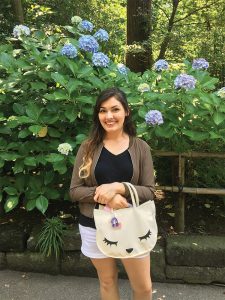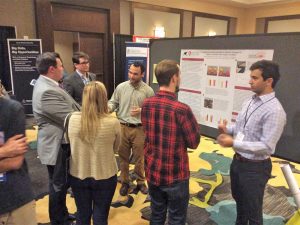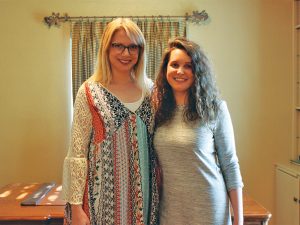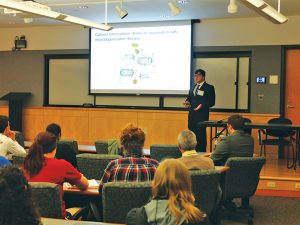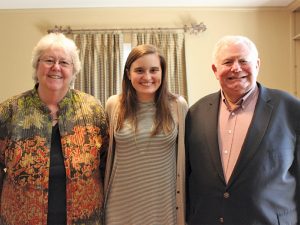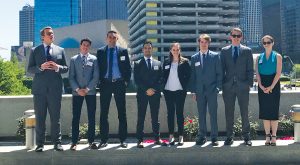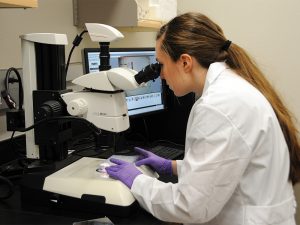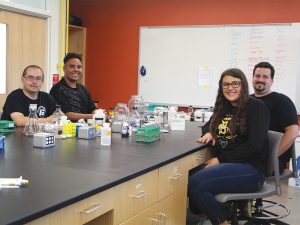When Brittany Subialdea ’17 came to Austin College, she realized a dream as the first in her family to attend college out of high school. She was drawn here by foreign language opportunities in Jordan Family Language House—imagining that one day she would teach English in Japan.
Following her plan to major in Japanese, she took her first-ever computer science course to satisfy a quantitative credit requirement. It was challenging, but studying computer science set in motion an unexpected new dream. While she was considering a meaningful minor, Dr. Aaron Block, associate professor of computer science, encouraged Brittany, telling her she was really good in computer science. She took classes to complete a minor, and during that study, realized she wanted to complete a major in the discipline.
As my college education comes to a close, I see now how the mentorship I received was instrumental in my academic growth,” Brittany said. “Growing up as a Hispanic, first-generation college student, I had never been exposed to the value of a computer science education. I enrolled in a computer science class by happenstance, and it quickly became my passion.”
Brittany’s interest grew in researching the intersection between theoretical solutions and real-world problems. She and Block worked together on a research project focused on designing and implementing a scheduling algorithm, with expectations that Brittany would present the work at a student research conference and submit their findings for publication.
Now, having completed her degree with majors in Japanese and computer science, her experience at Austin College gives her a boost as she takes a next step toward another once-unexpected dream. This spring, Brittany was awarded a National Science Foundation Graduate Research Fellowship. Of 13,000 applicants, only 2,000 individuals nationwide received the prestigious fellowship. Brittany will begin a Ph.D. program in computer science this fall at the University of North Carolina-Chapel Hill. She is the first in recent memory, or possibly ever, at Austin College to earn a NSFGR fellowship as an undergraduate. With the momentum of this life-changing opportunity, Brittany says she wants to be in a position to help other minority women understand their options in science, technology, engineering, and math—especially budding computer scientists.
Making the First Move with Early Research Opportunities for All Students
At Austin College, in-depth research is not saved for the last lap of college. Students in a wide variety of disciplines can begin research projects early in their academic careers and continue throughout their studies. Opportunities for research are embedded into regular coursework and offered through experiential learning opportunities, such as the Scarbrough Summer Research Program in the Humanities and Social Sciences, the College Honors Program, science research projects, and individual research questions in a number of disciplines. Collegial research, by common definition, produces new knowledge, is overseen by a faculty member, and is presented in a scholarly setting.
“Research for undergraduates at many other institutions is often characterized by ‘sitting and watching,’” said Dr. Lance Barton, associate professor of biology. “At Austin College we are into doing. As far as we’re concerned, undergraduate students seeking the solutions to research problems are the experts in the field on those questions. When an attending professor asks them for their opinions or ideas, it is not a trick question. The person who has the firsthand knowledge of all aspects of the problem, that person, is the expert.”
Barton also serves as the director of the Austin College Center for Research, Experiential, Artistic, and Transformative Education (CREATE), which supports and celebrates qualitative and quantitative research as well as the creation of original works in literature and the arts. Established in 2015, CREATE builds a bridge between theory in the classroom and realworld experience. By supporting the research component of education in all disciplines, Austin College helps students develop skills that transfer into the workplace, post-graduate education, and life in general—and gives them a shot at expertise along the way.
Moving Forward with Relevant Skills that Translate into Career Strengths
“We pose the overarching question, ‘can our students solve a problem?’” Barton said. “That’s what research is: dealing with ambiguity, knowing where to start, and mastering the fundamental skills of completing a research question.” Students in all disciplines are encouraged to participate in individual research, with up to 40 percent of the student body conducting at least one research project during the course of their undergraduate studies.
Dr. Lisa Brown, professor of psychology, said research builds skills that relate to nearly all career paths. “Research in psychology, particularly in social psychology, requires planning, attention to detail, perspective-taking, patience, and creativity,” she said. “Subtle variations in conditions or questions may undermine a study, so precision is key. Some studies focus on controversial or personal subjects, so undergraduate researchers must be particularly sensitive to responding to people’s verbal and non-verbal cues. These skills of being able to follow a specific protocol and maintain confidentiality, but also being flexible enough to respond to participants’ needs, can easily translate into jobs in which sensitive information is at stake and customer relations are pivotal.”
Barton, who advises and collaborates with biology research students, said, “Traditionally students in the sciences are taught to memorize; they learn theory instead of practice, and they cover content quickly to have it for the short term. They definitely can rock a test. However, it seems that the knowledge does not make the leap to the workforce because it’s long gone by then. Reinforcing knowledge through hands-on research helps Austin College students retain what they have learned.” At Austin College, with a 13:1 student-faculty ratio and access to facilities and resources that may rival some larger institutions, student researchers in all disciplines are able to create their own tradition. And, it begins with a strong mentoring relationship with an overseeing faculty member.
Students reap many benefits when working shoulder-to-shoulder with a faculty research advisor. “First, at the most basic level, being involved in research provides the student with another potential reference for a job or graduate school,” said Brown. “Having worked at a large university, I have been approached for a recommendation by a student whom I did not even recognize because she had been in a lecture of more than 100 people. While she knew I probably did not know her, I was one of the few professors she had a class from as most of her instructors had been graduate students.”
“So at a small college like Austin College, conducting research alongside a faculty member is another way in which students are able to make their strengths and abilities known to faculty who can then knowingly speak highly of them, in detail, to a potential employer or graduate or professional school,” Brown concluded.
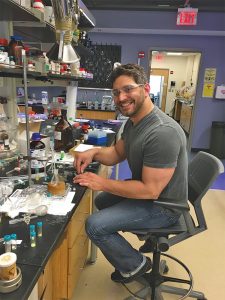 Rami Batrice ’08 entered Austin College with plans to attend medical school and hoped to boost his academic résumé with a research project. Dr. Bradley Smucker, professor of chemistry, agreed to mentor Batrice, then a sophomore, on his first project. Rami’s career plans transformed from medical doctor to scientist soon thereafter. “One semester of research turned into two, and so on,” Rami said. “Along the way, I realized I really liked the process, and I changed my major from psychology to chemistry. Starting off, I never thought pure science was my future.” By putting in the effort, he says he developed his critical thinking skills and a desire to discover knowledge rather than just use it.
Rami Batrice ’08 entered Austin College with plans to attend medical school and hoped to boost his academic résumé with a research project. Dr. Bradley Smucker, professor of chemistry, agreed to mentor Batrice, then a sophomore, on his first project. Rami’s career plans transformed from medical doctor to scientist soon thereafter. “One semester of research turned into two, and so on,” Rami said. “Along the way, I realized I really liked the process, and I changed my major from psychology to chemistry. Starting off, I never thought pure science was my future.” By putting in the effort, he says he developed his critical thinking skills and a desire to discover knowledge rather than just use it.
Rami holds a Ph.D. in inorganic chemistry from Technion-Israel Institute of Technology and now is doing post-doctorate work at Georgetown University in Washington, D.C. His lab conducts environmental chemistry research, including work on containing nuclear waste, seeking a replacement for rare earth elements in high-tech production, and degrading waste to make polluted water non-toxic.
“Even today, one thing that Dr. Smucker would say I can still hear in my head: ‘one hour in the library will save you a week in the lab.’ Meaning, you can gain inspiration and clever ideas from others doing similar work. And of course, since research is intended to develop new information, it’s very frustrating to learn that something you’ve put a month into has already been published,” Rami said.
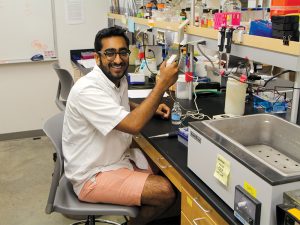 Thoroughly Exploring All the Options
Thoroughly Exploring All the Options
As a biology major with plans for a medical career, Dilan Shah ’17 worked through several research questions in his years at Austin College, starting as a freshman. He admits that early on, he expected only to hone basic laboratory skills such as protocols or handling a pipette. But, many, many hours, days, and nights in the lab later, he says the experience was all-inclusive.
“I have friends who have done research at other institutions, and they have mastered one aspect of a project. But I have been privileged to do all aspects, and work with people who trust me with the resources to do the whole thing: develop the idea, design the experiment, and figure out how we’re going to afford it,” Dilan said. He completed a grant proposal and received a $964 grant from Sigma Xi scientific research society and the American Association for the Advancement of Science, and a $500 Beta Beta Beta (biology honor society) Research Scholarship to help fund his senior honors thesis work on anti-cancer drugs. (Yes, that’s an undergraduate working to end cancer.) He’s not alone in that. Austin College has offered a Cancer Biology course since 2014, which receives support from The Discovery Foundation of Dallas, Texas. During the class taught by Barton (and during a summer research component), students generate new cancer cell lines that can be further characterized in the course. For each new cell line generated, students collect data on genetic and genomic instability, metastatic potential, and proliferative capacity, while also learning the biological mechanisms behind these phenotypes of cancer and delving deeply into the primary literature through classroom discussions. Students take part in an open-to-the-public Women’s Health and Cancer Forum each fall. Last November, Dr. Sendurai Mani, associate professor in the department of Translational Molecular Pathology at The University of Texas MD Anderson Cancer Center, spoke during the event.
As Austin College students work a research problem from front to back, they collaborate rather than compete for ideas in the lab. Rami said he loved the collaborative effort and the opportunity to learn from one another. “I know I didn’t think it was a big deal to work in a cooperative setting at the time, but in the profession, it’s very competitive—cutthroat even,” he said. “Students helping one another out without worrying if someone is going to steal your ideas is a great way to grow as a scientist.”
CREATE also is working to develop a Community of Scholars for students who are interested in taking collaboration a step further through sharing best practices, general support, and camaraderie—and maybe a little competition, but just for motivation. Access to mentors and fellow students builds communication and relationship skills, while access to current, real-world tools builds practical research skills.
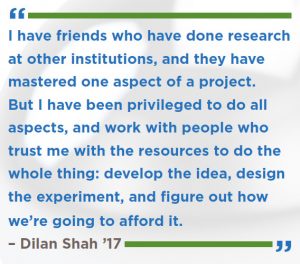 Brady Flanery ’17 completed his honors thesis, titled “You May All Go to Hell, and I Will Go to Texas: Migration Patterns and the Evolving Political Culture in Texas 1850-2010,” with supervision from Dr. Nate Bigelow, associate professor of political science.
Brady Flanery ’17 completed his honors thesis, titled “You May All Go to Hell, and I Will Go to Texas: Migration Patterns and the Evolving Political Culture in Texas 1850-2010,” with supervision from Dr. Nate Bigelow, associate professor of political science.
“During the early parts of my research, Nate and I used SPSS, software commonly used for statistical analysis in social science, to run certain tasks that included many steps and certain settings. It was extremely valuable to take note of each step so that it would be easier to write about the methods of my project four months later,” Brady said.
 Even in the study of classics, Austin College students have the advantages of digital resources. Desiree Coleman ’17 completed an honors thesis, titled “Cicero and the Complexities of Reciprocity in Friendship in the Late Roman Republic” to earn Honors in Classics. “Although still in its infancy, there are great online resources for academics in the field of classics such as the Perseus Digital Library at Tufts University and Whitaker’s Words software. That said, nothing replaces physical books, especially since some books and journals I needed were not available online, and they are handy references for citations. For the classics, books also have the advantage of being subjected to more thorough editing and review, making them more reliable sources at this point,” Desiree said.
Even in the study of classics, Austin College students have the advantages of digital resources. Desiree Coleman ’17 completed an honors thesis, titled “Cicero and the Complexities of Reciprocity in Friendship in the Late Roman Republic” to earn Honors in Classics. “Although still in its infancy, there are great online resources for academics in the field of classics such as the Perseus Digital Library at Tufts University and Whitaker’s Words software. That said, nothing replaces physical books, especially since some books and journals I needed were not available online, and they are handy references for citations. For the classics, books also have the advantage of being subjected to more thorough editing and review, making them more reliable sources at this point,” Desiree said.
This fall, Desiree will attend graduate school at the University of Arizona to complete a master’s program in classics with an emphasis in Latin pedagogy. She plans to become a Latin teacher at the elementary and high school level. “Dr. Bob Cape (professor of classics) repeatedly told me to ‘narrow down’ what I was emphasizing in my research and to make sure that it was backed up with solid evidence from the original Latin and Greek. This advice not only helped me to realize what I should focus on while researching but prepared me to know what to expect when I enter graduate school this fall,” she said.
Developing Communication Skills and Cultivating Character Qualities
 Student researchers commonly attend regional and national conferences in various disciplines, such as economics, history, psychology, sociology, and specific fields in the sciences. Spending time with students and faculty from across the nation exposes Austin College students to the many possibilities in their field of research.
Student researchers commonly attend regional and national conferences in various disciplines, such as economics, history, psychology, sociology, and specific fields in the sciences. Spending time with students and faculty from across the nation exposes Austin College students to the many possibilities in their field of research.
Six summer 2016 research students presented their results at the American Chemical Society Southwest Regional Meeting in Galveston, Texas, last fall. They exchanged ideas and fostered collaborations with chemists from all over the Southwest. Smucker accompanied the group and said the students learned about research happening at graduate schools, explored careers in chemistry, and saw the latest instrumentation technologies.
Barton explained that because Austin College students bring their own highly developed skills when they attend these competitions, they don’t just do well—they dominate.
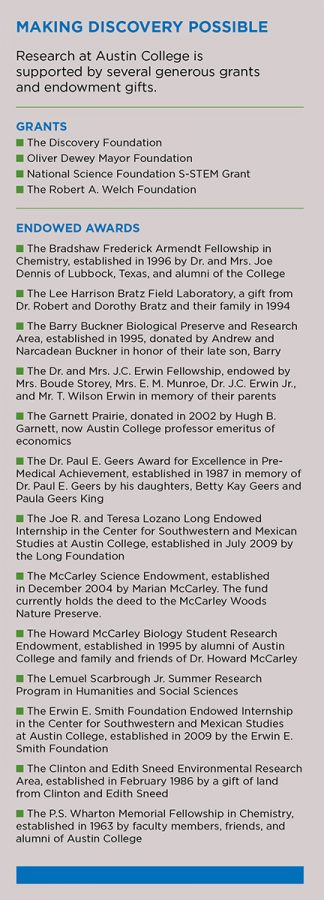 Dr. David Aiello, associate professor of biology, and several of his research students attended the Annual Meeting of the Texas Genetic Society, hosted by Texas A&M University. Francisco Neal ’17 won Best Undergraduate Poster Presentation at the conference. “I enjoyed the variety at the conference,” Francisco said. “The general theme was genetics, but the projects investigated genetics in a variety of systems, including monarch butterflies, yeast, and cattle. It also reinforced the point that proper communication is a key feature of science.” He begins an M.D./Ph.D. program at The University of Texas Health Science Center–San Antonio this fall. Other winners at the conference were Katrina Ngo ’17 and Rebecca McDonald ’18 for Best Undergraduate Platform Presentation.
Dr. David Aiello, associate professor of biology, and several of his research students attended the Annual Meeting of the Texas Genetic Society, hosted by Texas A&M University. Francisco Neal ’17 won Best Undergraduate Poster Presentation at the conference. “I enjoyed the variety at the conference,” Francisco said. “The general theme was genetics, but the projects investigated genetics in a variety of systems, including monarch butterflies, yeast, and cattle. It also reinforced the point that proper communication is a key feature of science.” He begins an M.D./Ph.D. program at The University of Texas Health Science Center–San Antonio this fall. Other winners at the conference were Katrina Ngo ’17 and Rebecca McDonald ’18 for Best Undergraduate Platform Presentation.
Dr. Renee Countryman, associate professor of psychology, said, “The benefits of preparing and presenting at these conferences are to experience an academic conference and, more importantly, to improve a student’s ability to discuss research with an audience. I think that for our naturally outgoing students, conference presentations are just plain fun.”
“But, when our more reserved students present their research, they are pushed to grow in ways that they wouldn’t seek to grow,” Countryman said. “This experience prepares them for what is a normal expectation of students in graduate school. When I speak to our alumni who have gone on to graduate programs, they always report how prepared they were, and they are thankful for their experiences at Austin College.”
While in research mode, students often develop new knowledge of themselves. Austin College’s STEM Teaching And Research (STAR) Leadership Program is designed as a unique program to integrate the development of vital leadership skills in interpersonal effectiveness, collaboration, problem solving, and ethical responsibility into the curriculum in the sciences. So, students cultivate the skills they will need in the workplace and beyond as they are learning their subject matter.
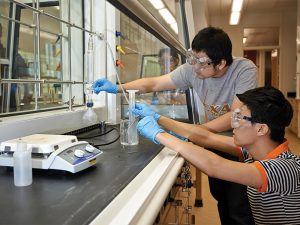 “Being in a research group, of course, helps with your people and cooperative skills, and that’s a big part of the STAR Leadership Program as well,” said Eva Natinsky ’19, a student researcher working in Adams Observatory. “We had a few STAR mini-project sessions where we evaluated how well our group worked together and what each member contributed; I think discussing it helped me contribute better work to the group.”
“Being in a research group, of course, helps with your people and cooperative skills, and that’s a big part of the STAR Leadership Program as well,” said Eva Natinsky ’19, a student researcher working in Adams Observatory. “We had a few STAR mini-project sessions where we evaluated how well our group worked together and what each member contributed; I think discussing it helped me contribute better work to the group.”
“I’ve always been a quiet and reserved person,” said physics major Ryan Hood ’17. “It was hard for me to be the leader in a group even when the group needed that from me. Like pretty much everything in life, the only way to become a leader is to lead. These research classes, unlike typical lecture-based classes, provide people like me the opportunity to practice these skills. I think I am a better leader because of it.”
Failure, too, has its lessons. “Failure is the norm when doing research,” Ryan said. “If you are not stuck on a problem while doing research … then you are about to be. In that sense, research is humbling. But there also is no greater feeling than solving a difficult problem previously thought to be impossible. Doing so requires resilience.”
Dilan said that he learned about his own ethics and morals while studying biology and potential treatment protocols for cancer. “With the current climate, you have to be skeptical of yourself and everyone else,” he said. “It’s very easy to interpret data how you want to. You have to ask yourself, are you willing to be challenged with a failure and keep working, or will you move forward with your own interpretation of the data?”
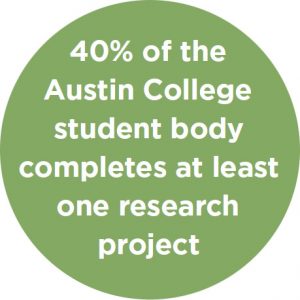 A Scholar in Motion, Stays in Motion
A Scholar in Motion, Stays in Motion
Due to the early and frequent access to undergraduate research and cutting-edge resources, many students confirm their interest in a certain field.
“I’ve always had an interest in physics,” said Ryan. “I knew I wanted to work with either very small-scale physics—such as quantum mechanics, particles physics, or nuclear physics—or very large-scale physics such as astronomy. It became clear when I took observational astronomy.”
Dr. David Baker, physics professor and director of Austin College’s Adams Observatory, said students in the Physics Department Research Experience course observed exoplanets called “hot jupiters” with the research-grade Adams Observatory telescope. Though they observed known planets and had no discoveries, it was a good test of students’ capabilities as this was the first time hot jupiters were observed in Adams.
“I realized the power of astronomical imaging devices,” Ryan said. “My mind already was set on astronomy but the research class really solidified my choice.” He begins graduate work in astronomy at the University of Oklahoma this fall.
Eva joined Ryan and Baker in Adams Observatory. “Working on exoplanet detection methods was something I was excited about and really enjoyed,” she said. “I’m still unsure about what specific career path I’d like to pursue, but I definitely think astrophysics research is an option.” Due in part to a strong research résumé from Austin College, this summer Eva is doing undergraduate research funded by the National Science Foundation at Rensselaer Polytechnic in New York in the field of particle astrophysics. She’ll return to Austin College this fall and take on advanced research with Dr. Don Salisbury, professor of physics.
Each spring, researchers proceed from Austin College labs and libraries to careers and further study to apply knowledge gained and experiences achieved.
Research yields results, the kind measured by data and the kind measured by solutions. As problem solvers, Austin College students grow in goal-setting, discernment, resilience, work ethics, and moral ethics. In building skills, knowledge, relationships, and résumés, Austin College students who dare to ask new questions and dream new dreams are propelled forward, ready to take on new challenges and opportunities.
|
Next: Class Notes


